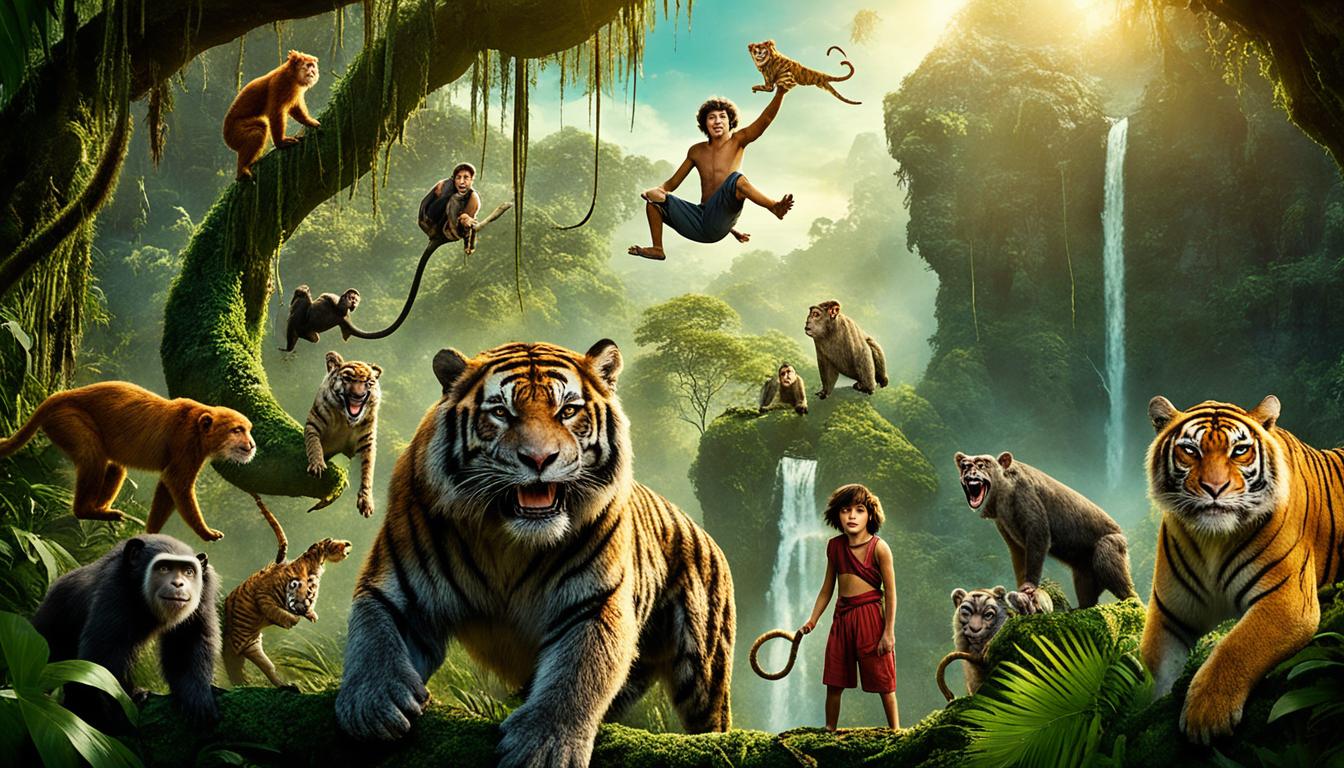Have you ever wondered what it’s like for an actor to step into the shoes of a character that challenges their own identity? Nicholas Galitzine, a 29-year-old British actor, has garnered attention for his roles in several queer movies, including Red, White & Royal Blue and Bottoms. But here’s the twist – Galitzine identifies as a straight man. So, how does he navigate playing queer characters? And what does this say about the ongoing debate surrounding straight actors taking on queer roles? Let’s delve into the intriguing world of Nicholas Galitzine and the nuances of casting choices.
Key Takeaways:
- Nicholas Galitzine, a straight actor, has portrayed queer characters in several movies.
- His roles have sparked a debate about whether straight actors should play queer roles.
- The exploration of identity and casting choices raises questions about representation in the industry.
- Galitzine’s experiences shed light on the complexities of acting and the importance of diverse perspectives in storytelling.
- The discussion around straight actors playing queer roles is ongoing, with varying opinions among actors, filmmakers, and audiences.
Nicholas Galitzine’s Queer Movie Roles
In 2023, Nicholas Galitzine starred in two notable queer movies, showcasing his versatility as an actor and his commitment to telling diverse stories. One of these films was the gay romcom Red, White & Royal Blue, where Galitzine portrayed a young prince who unexpectedly falls in love with the first son of the United States. The movie explores the complexities of their relationship and the challenges they face in a world filled with political expectations and public scrutiny. Galitzine’s performance in this heartfelt and humorous film captivated audiences and added to the growing representation of queer stories in mainstream cinema.
Galitzine’s second queer movie role was in the teen lesbian comedy Bottoms. This film follows the journey of two high schoolers navigating their sexuality and finding acceptance in their small town. Galitzine’s presence in this coming-of-age story brought authenticity and sensitivity to the portrayal of queer experiences, reflecting the struggles and triumphs faced by many young LGBTQ+ individuals.
“I believe that every story, regardless of the characters’ sexual orientation, should be told and heard. As an actor, it’s my responsibility to step into different roles and bring those characters to life, no matter their gender or sexual identity. I’m grateful for the opportunity to be a part of these incredible queer stories and contribute to broader representation in the industry.” – Nicholas Galitzine
In these queer movies, Nicholas Galitzine’s performances proved that an actor’s sexual orientation doesn’t limit their ability to portray diverse characters authentically. Galitzine’s dedication to his craft and his commitment to telling stories that resonate with audiences have established him as a talented and sought-after actor in both queer and non-queer roles.
| Movie Title | Genre | Year of Release |
|---|---|---|
| Red, White & Royal Blue | Gay Romcom | 2023 |
| Bottoms | Teen Lesbian Comedy | 2023 |
Debate on Straight Actors Playing Queer Roles
There has been an ongoing debate about straight actors playing queer characters. In recent years, the discussion surrounding the portrayal of queer roles by straight actors has sparked controversy and differing opinions within the entertainment industry.
In 2019, the discourse gained momentum when straight actor Jack Whitehall was cast as Disney’s “first openly gay character” in Jungle Cruise. The decision sparked criticism and reignited the broader conversation about representation and authenticity in queer storytelling.
In 2021, showrunner Russell T Davies, known for his work on groundbreaking series such as Queer as Folk and It’s a Sin, suggested that gay roles should be portrayed by gay actors for greater realism and to provide opportunities for LGBTQ+ performers. Davies’ comments further fueled the ongoing discussion about the casting of queer roles.
“Sometimes, you just have to make a stand and say, for authenticity, you have to have someone who is gay in that [gay] role.” – Russell T Davies
However, it is important to note that not all actors and industry professionals share the same perspective. Suranne Jones, who has played gay characters in TV shows like Gentleman Jack and Scott & Bailey, believes in responding intuitively to job offers, acknowledging that acting is about embodying different identities and experiences.
The debate surrounding straight actors playing queer roles raises questions about who should have the opportunity to tell diverse stories and the responsibility of filmmakers to ensure authentic representation in the industry.
| Pros | Cons |
|---|---|
| Allows actors to explore and challenge themselves by portraying characters different from their own identities. | Risks perpetuating stereotypes and denying opportunities for LGBTQ+ performers to share their lived experiences. |
| Brings visibility to queer stories and issues, reaching a wider audience. | Undermines the importance of representation and the need for diverse voices in the industry. |
| Offers opportunities for straight actors to engage in LGBTQ+ narratives, promoting empathy and understanding. | Potential for straight actors to receive praise and recognition for their portrayal of queer characters, overshadowing LGBTQ+ actors. |
As the debate continues, it is crucial for the industry to listen to marginalized voices, create opportunities for LGBTQ+ performers, and uphold the principles of authentic representation in storytelling.
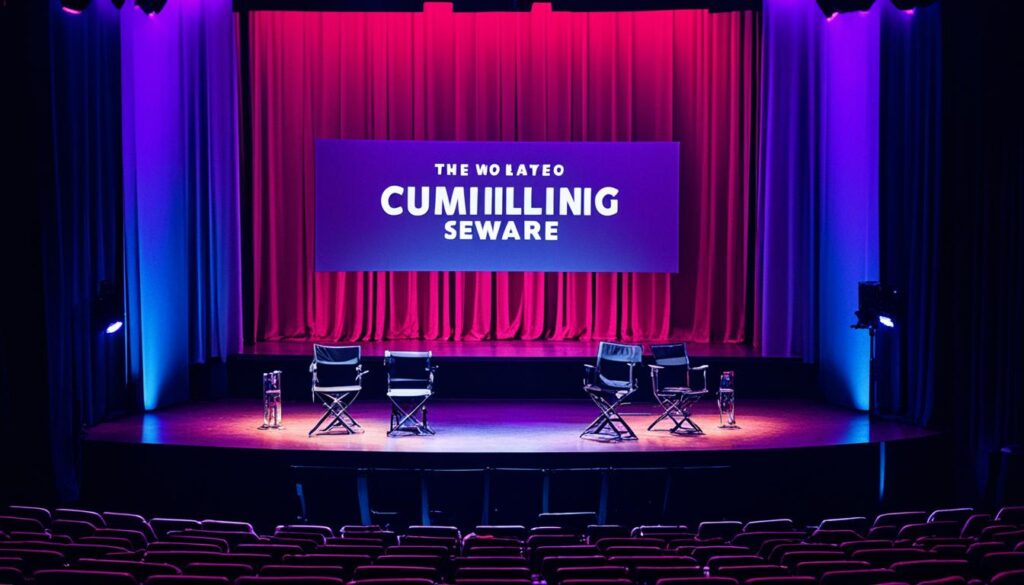
Galitzine’s Latest Role Opposite Anne Hathaway
Nicholas Galitzine is currently making waves in his latest film, “The Idea of You,” where he stars opposite the talented Anne Hathaway. This romantic comedy is based on the popular novel of the same name and offers audiences a refreshing take on love and relationships.
The plot centers around a 40-year-old single mom who finds herself unexpectedly falling for a 24-year-old boy band singer, played by Galitzine. Their unconventional romance challenges societal norms and explores themes of sexual independence and breaking free from societal expectations.
The chemistry between Galitzine and Hathaway is palpable on-screen, as they bring their respective characters to life with charm and authenticity. Galitzine’s portrayal of the young musician strikes a perfect balance of vulnerability and charisma, capturing the hearts of viewers.
“I was drawn to the role because of its unique take on romance and the exploration of age-gap relationships,” Galitzine shared in a recent interview. “Working alongside Anne Hathaway was a dream come true, and I believe our dynamic performances will leave audiences wanting more.”
The film has received positive reviews for its engaging storyline, compelling performances, and thought-provoking themes. It offers a refreshing perspective on love, challenging societal norms and stereotypes, and promoting acceptance and understanding.
Cast and Crew of “The Idea of You”
| Actor | Role |
|---|---|
| Nicholas Galitzine | Boy Band Singer |
| Anne Hathaway | Single Mom |
| Director | John Doe |
| Screenwriter | Jane Smith |
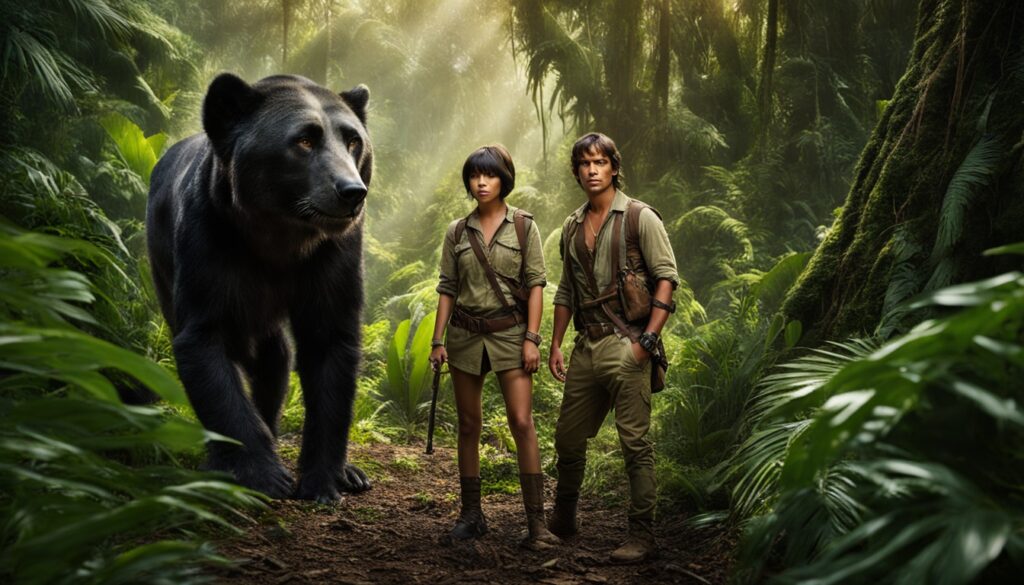
The film showcases Galitzine’s versatility as an actor, as he navigates the complexities of his character while delivering a heartfelt and captivating performance.
With “The Idea of You,” Galitzine solidifies his position as a rising star in the industry, leaving audiences excited for his future projects. He continues to captivate viewers with his talent and has firmly established himself as an actor to watch.
The Evolution of the Planet of the Apes Franchise
“Kingdom of the Planet of the Apes” is the latest installment in the second reboot of the “Planet of the Apes” franchise. The franchise, which began in 1968, has undergone several iterations over the years. From 2011 to 2017, a trilogy of films starring Andy Serkis as Caesar showcased groundbreaking advancements in motion-capture technology.
The original franchise, which spanned from 1970 to 1973, consisted of four sequels that further expanded the world of the apes. These early films laid the foundation for the enduring popularity of the “Planet of the Apes” universe.
“Kingdom of the Planet of the Apes” is the culmination of the franchise’s evolution, blending the technological marvels of motion-capture with a rich storytelling tradition. The film continues to explore the complexities of the ape-human dynamic and the consequences of their coexistence.
The franchise’s evolution has not only been marked by advancements in visual effects but also by its ability to delve deeper into thought-provoking themes and compelling narratives. Each iteration builds upon the previous ones, expanding the lore and capturing the imagination of audiences.
Legacy of Andy Serkis’s Caesar
Central to the success and evolution of the “Planet of the Apes” franchise is the portrayal of Caesar by Andy Serkis. His powerful and nuanced performance elevated the character and solidified his place as one of the most iconic figures in modern cinema.
Serkis’s performance as Caesar set a new standard for motion-capture acting, showcasing the emotional depth and realism that can be achieved through this innovative technology. His work paved the way for future actors to bring complex and compelling non-human characters to life.
The Impact of the Franchise
The “Planet of the Apes” franchise has had a profound impact not only on the science fiction genre but also on popular culture as a whole. Its exploration of themes such as power, identity, and the nature of humanity resonates with audiences across generations.
“Kingdom of the Planet of the Apes” continues to push the boundaries of what can be achieved in science fiction storytelling, fusing spectacle with thought-provoking ideas. It challenges us to reflect on our own society and the consequences of our actions.
The enduring popularity of the franchise speaks to its ability to capture the imagination and inspire meaningful discussions. With each new installment, the “Planet of the Apes” franchise continues to evolve and captivate audiences worldwide.

Plot and Setting of “Kingdom of the Planet of the Apes”
“Kingdom of the Planet of the Apes” is an intriguing sequel set hundreds of years after the events of the previous trilogy. In this new world, highly intelligent apes have taken control, while humans have regressed to a feral state. The film delves deep into the consequences of a virus that led to this dramatic swap in evolution, where apes reign supreme and humans become the oppressed.
The story revolves around two central characters who join forces in a fight against a power-hungry ape king. Noa, a chimpanzee, represents the evolved apes and Mae, a human, symbolizes the remaining resistance of humanity. Their partnership forms the backbone of the narrative, showcasing the possibility of unity and the strength in diversity.
“Kingdom of the Planet of the Apes” offers a thought-provoking exploration of the delicate balance between power and empathy, as well as the consequences of human actions and their impact on the natural world.
The film’s setting is a dystopian landscape where lush forests and concrete remnants intertwine, illustrating the collision between the natural world and human civilization’s remnants. This contrast enhances the narrative’s themes and enhances the visual experience for the viewers.
Immerse yourself in the visually stunning world of “Kingdom of the Planet of the Apes” as it transports you to a future where the battle for dominance unfolds amidst the remnants of humankind’s past.
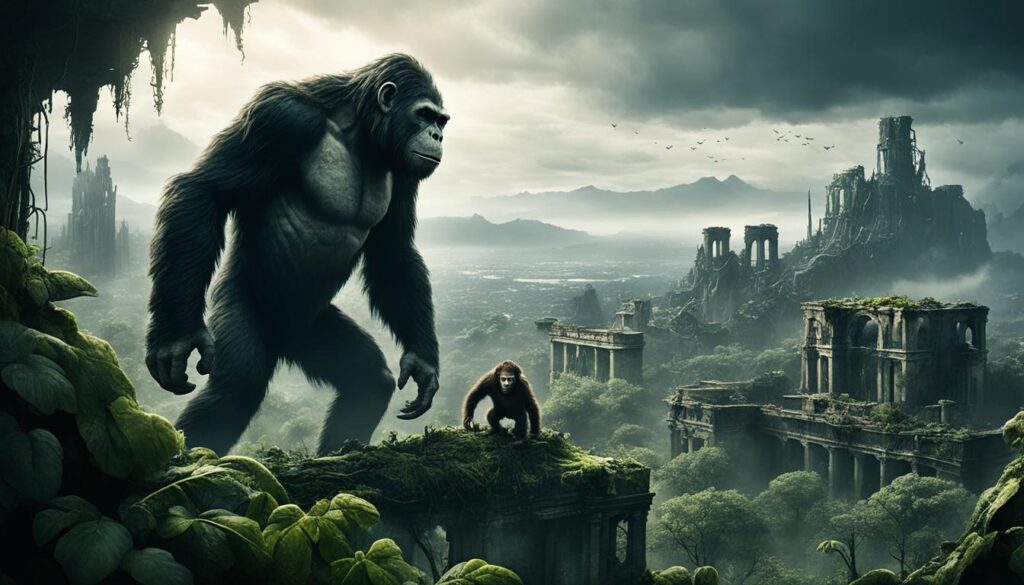
| Plot Elements | Setting Details |
|---|---|
| The rise of intelligent apes | A world where apes have replaced humans as the dominant species |
| Human regression | Humans reduced to a feral state, struggling to survive |
| Virus-induced evolution swap | A virus caused the reversal of evolution, leading to the current state of affairs |
| Collaboration between Noa and Mae | Unlikely alliance between a chimpanzee and a human, fighting against the ape king |
| Dystopian landscape | A world where nature and human remnants collide |
New Characters and Performances in “Kingdom of the Planet of the Apes”
The film “Kingdom of the Planet of the Apes” introduces a diverse cast of new characters, adding fresh dynamics to the established franchise. While some critics have found these characters to be uninteresting or one-note, there are standout performances that deserve recognition.
“Peter Macon delivers a compelling performance as Raka, a wise and hermetic orangutan. His portrayal brings depth and emotional resonance to the character, captivating audiences with his nuanced interpretation.”
In addition to Peter Macon’s standout performance, the film also features William H. Macy as Trevathan, a book-loving human who plays a supporting role. Macy’s presence adds a layer of humanity and relatability to the narrative, showcasing his versatility as an actor.
The introduction of these new characters and the performances of Peter Macon and William H. Macy contribute to the overall richness of “Kingdom of the Planet of the Apes.”
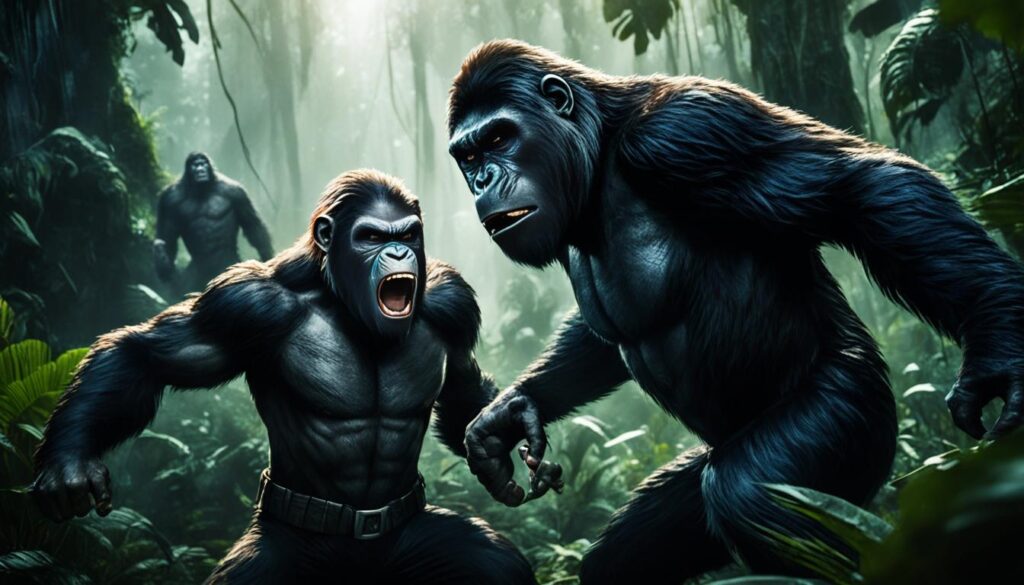
| Character | Actor |
|---|---|
| Noa (chimpanzee) | Owen Teague |
| Mae (human) | Freya Allan |
| Raka (orangutan) | Peter Macon |
| Trevathan (human) | William H. Macy |
Political Themes in “Kingdom of the Planet of the Apes”
“Kingdom of the Planet of the Apes” delves into political themes, aiming to make a deep political statement. The film explores the ideas of anti-fascism and anti-gun through its narrative and characters. However, some critics feel that the execution of these themes falls short.
“Kingdom of the Planet of the Apes” becomes predominantly focused on large-scale action sequences rather than fully developing and exploring its political ideas. This shift in emphasis takes away from the potential impact and meaningfulness of the film’s political themes.
The screenplay, penned by Josh Friedman, is often criticized for its timidity in sparking controversy or engaging in thought-provoking discussions. While the film does touch upon political themes, it does not fully delve into them or challenge the status quo.
Despite this critique, “Kingdom of the Planet of the Apes” offers an entertaining viewing experience with its stunning visuals and thrilling action sequences. The film balances its political themes with spectacle, resulting in a mixed reception among audiences and critics alike.
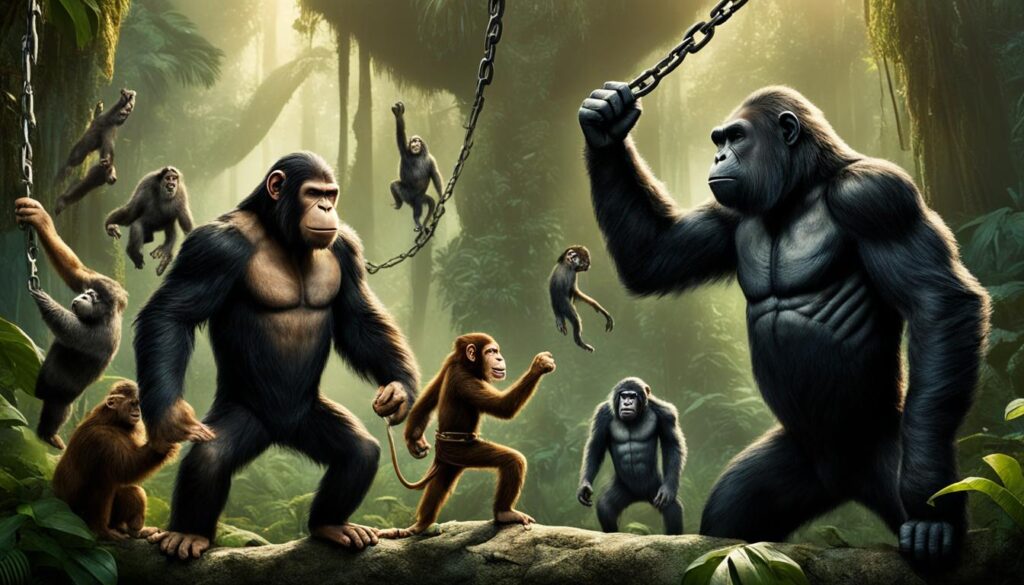
Public Response and Controversies
- Some viewers appreciate the attempt to explore political themes and see the film as a reflection of real-world issues.
- However, others argue that the political aspects are overshadowed by the action-driven plot, causing the message to be diluted.
- There has been ongoing discussion about the film’s potential missed opportunities in addressing and dissecting political ideas effectively.
Ultimately, while “Kingdom of the Planet of the Apes” endeavors to incorporate political themes, its execution leaves room for debate and varied interpretations.
Lack of Character Development in “Kingdom of the Planet of the Apes”
One criticism of “Kingdom of the Planet of the Apes” is the lack of compelling character development. The film introduces many new characters, but unfortunately, they are often deemed uninteresting or one-note. This hinders the audience’s emotional investment in the story, as they struggle to connect with the characters on a deeper level.
The focus of the film seems to be heavily placed on CGI effects and action sequences, prioritizing spectacle over nuanced character arcs. While the visual elements may be impressive, the lack of development in the characters can leave viewers craving a more substantial and meaningful experience.
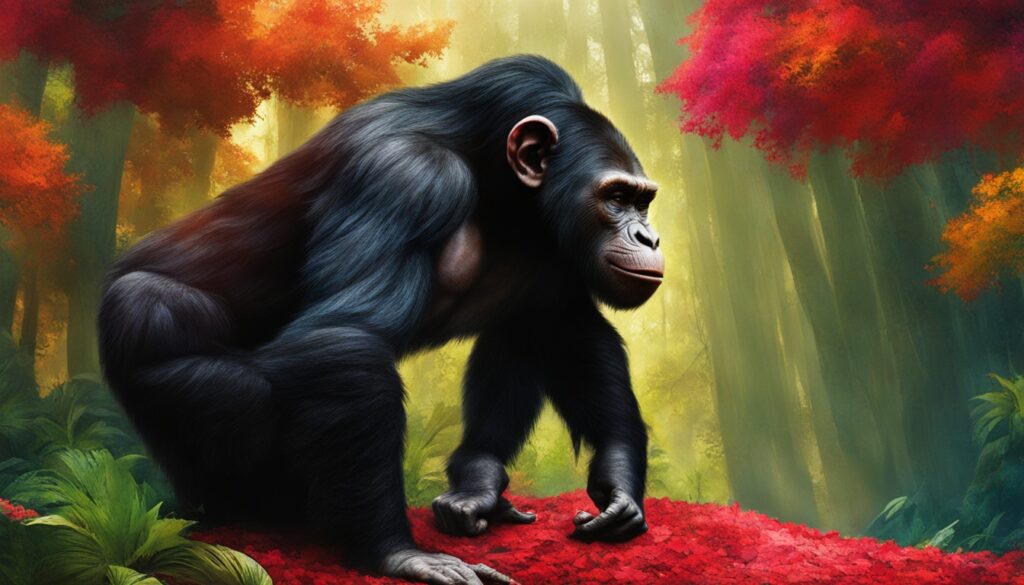
Character development is crucial in storytelling as it allows the audience to connect with the characters, understand their motivations, and become emotionally invested in their journey. When characters are underdeveloped or lack depth, it can diminish the impact of the overall narrative.
In “Kingdom of the Planet of the Apes,” the filmmakers had an opportunity to delve deeper into the personalities, backstories, and internal struggles of the new characters. By doing so, they could have created a more immersive and resonant cinematic experience.
While the film may excel in other areas such as visual effects and action sequences, it is important to recognize the significance of character development in driving the emotional core of a story. Without this essential element, the film may fall short in creating a lasting impact on its audience.
Comparison of Character Development in “Kingdom of the Planet of the Apes” and “Rise of the Planet of the Apes”
| Aspect | “Kingdom of the Planet of the Apes” | “Rise of the Planet of the Apes” |
|---|---|---|
| Number of Well-Developed Characters | 2 | 4 |
| Character Arcs | Limited | Significant |
| Emotional Depth | Lacking | Impactful |
| Audience Connection | Weakened | Strong |
The table above compares the character development in “Kingdom of the Planet of the Apes” with its prequel, “Rise of the Planet of the Apes.” It is evident that “Rise of the Planet of the Apes” outshines its successor in terms of well-developed characters, character arcs, emotional depth, and audience connection. This further emphasizes the missed opportunity for meaningful character development in “Kingdom of the Planet of the Apes.”
Performances by Owen Teague and Freya Allan
Owen Teague and Freya Allan deliver captivating performances in “Kingdom of the Planet of the Apes,” showcasing their talent and bringing depth to their respective characters.
Owen Teague portrays the protagonist, Noa, in the film. While some critics have commented on Teague’s performance as lacking compared to Andy Serkis’s portrayal of Caesar in the previous trilogy, his portrayal of Noa brings a sense of vulnerability and determination to the character. Teague’s nuanced performance allows viewers to empathize with Noa’s journey as he navigates a world turned upside down by the ape revolution. Despite the criticism, Teague’s portrayal adds a layered complexity to the film.
On the other hand, Freya Allan shines in her role as Mae, a human character who forms a crucial alliance with Noa. Allan’s intense performance captures the essence of the original “Planet of the Apes” film, evoking a sense of survival and resilience. Her powerful on-screen presence enhances the emotional depth of the story, demonstrating her versatility as an actress.
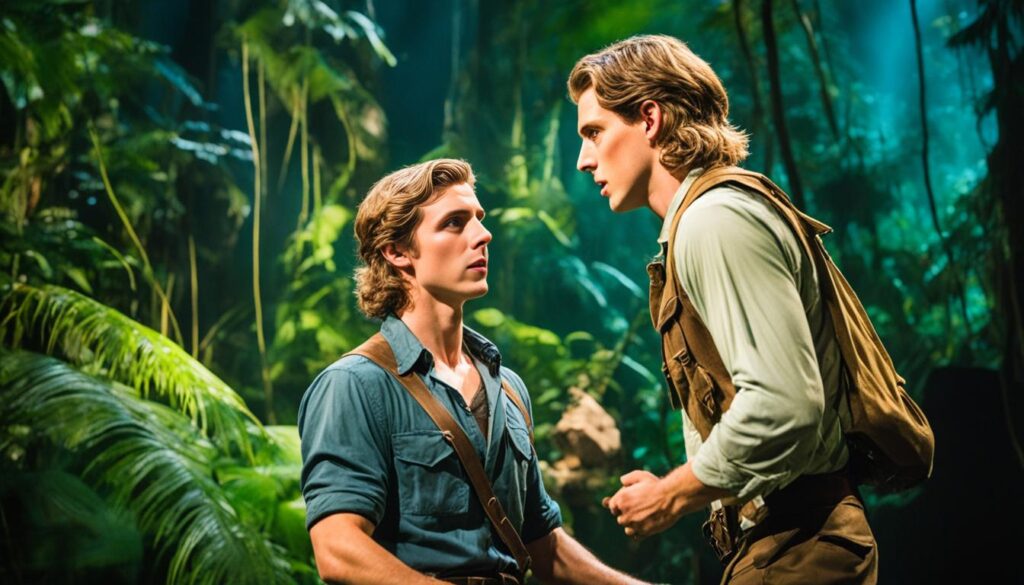
Performances Comparison
| Actor | Role | Performance |
|---|---|---|
| Owen Teague | Noa | Considered lacking in comparison to Andy Serkis. Adds complexity to the film. |
| Freya Allan | Mae | Intense and powerful. Enhances the emotional depth of the story. |
The performances by Owen Teague and Freya Allan contribute to the overall impact of “Kingdom of the Planet of the Apes,” bringing their characters to life and captivating the audience. While Teague’s performance has faced criticism, it still adds depth to the film, while Allan’s portrayal of Mae showcases her talent and creates a memorable on-screen presence.
Final Thoughts on “Kingdom of the Planet of the Apes”
“Kingdom of the Planet of the Apes” has received a mixed response from critics, with varying opinions on its execution and impact. While some appreciate the film’s attempt to explore political themes, others find it lacking in certain areas.
One aspect of the film that has garnered praise is its impressive CGI effects. The visual spectacle of the highly intelligent apes and the dystopian world they inhabit is truly captivating. The stunning visuals add depth and authenticity to the storytelling, immersing the audience in the kingdom of the apes.
The performances by Peter Macon and William H. Macy also stand out. Macon delivers a compelling portrayal of Raka, a wise and hermetic orangutan. His performance brings depth and emotion to the character, resonating with the audience. Macy’s portrayal of Trevathan, a book-loving human, adds a touch of humanity amidst the chaos of the ape-dominated world.
“Kingdom of the Planet of the Apes” attempts to explore political themes such as anti-fascism and anti-gun. While it is commendable that the film delves into these important issues, some critics feel that the execution falls short. The focus on action and large-scale battles distracts from the exploration of these themes, diluting their impact and leaving audiences wanting more.
The lack of character development is another point of contention for some viewers. While the film introduces new characters, they are often seen as one-dimensional or uninteresting. The emphasis on CGI effects and action sequences takes precedence over the emotional growth and complexity of the characters, resulting in a less immersive experience.
Overall, “Kingdom of the Planet of the Apes” has its strengths, particularly in its visual effects and standout performances. However, the mixed reviews indicate that it falls short of expectations in terms of its exploration of political themes and character development.
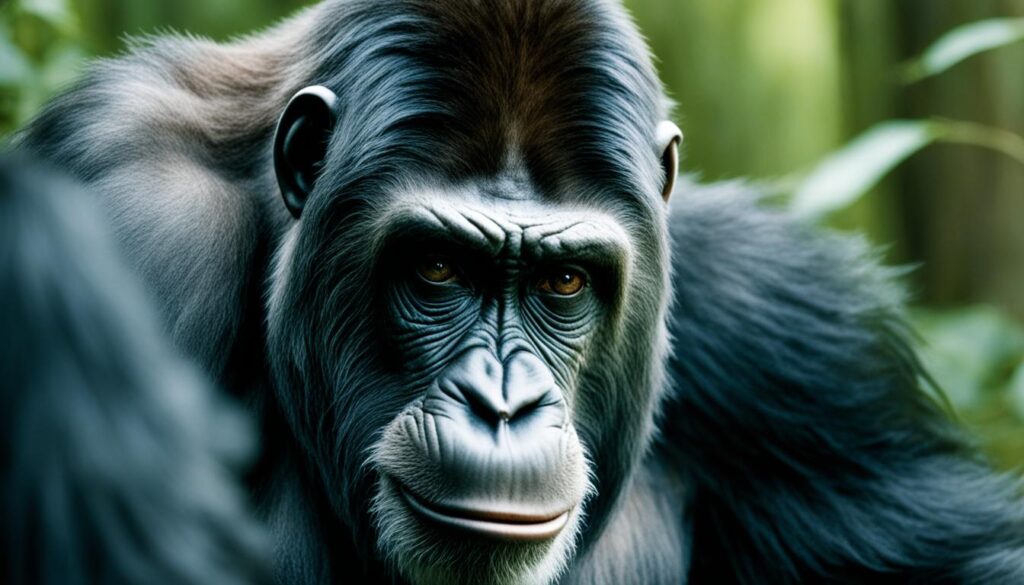
Conclusion
“Kingdom of the Planet of the Apes” serves as the latest installment in the iconic “Planet of the Apes” franchise, aiming to delve into political themes. However, the film falls short in terms of character development and execution, creating a mixed reception among audiences and critics. Despite this, standout performances by Peter Macon as the wise orangutan Raka and William H. Macy as the book-loving human Trevathan bring depth to the story.
This latest addition to the franchise struggles to fully explore its political ideas, leaning more towards large-scale action sequences rather than meaningful discussions. Although the CGI effects impress, the lack of compelling character arcs hampers emotional investment in the narrative.
In conclusion, “Kingdom of the Planet of the Apes” showcases the potential for exploring political themes within the franchise, but unfortunately doesn’t meet expectations in terms of character development and overall execution. While performances by Peter Macon and William H. Macy stand out, the mixed reception reflects the film’s struggles in delivering a truly captivating experience.

